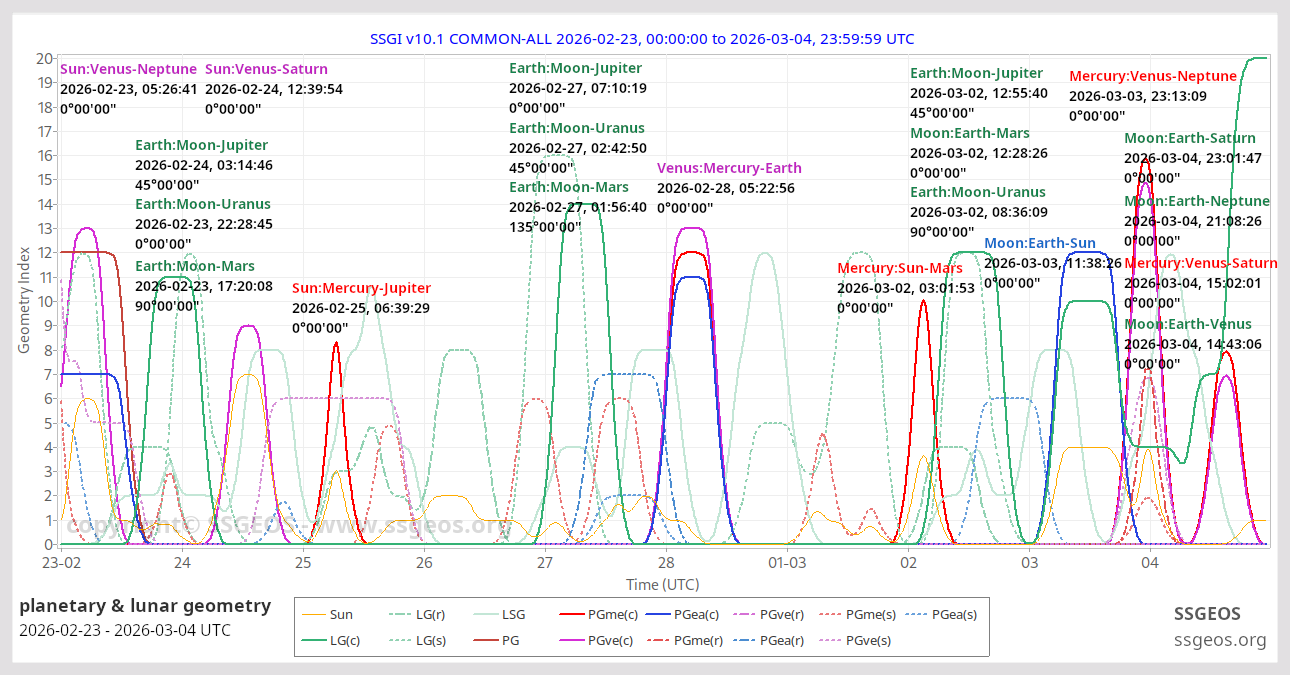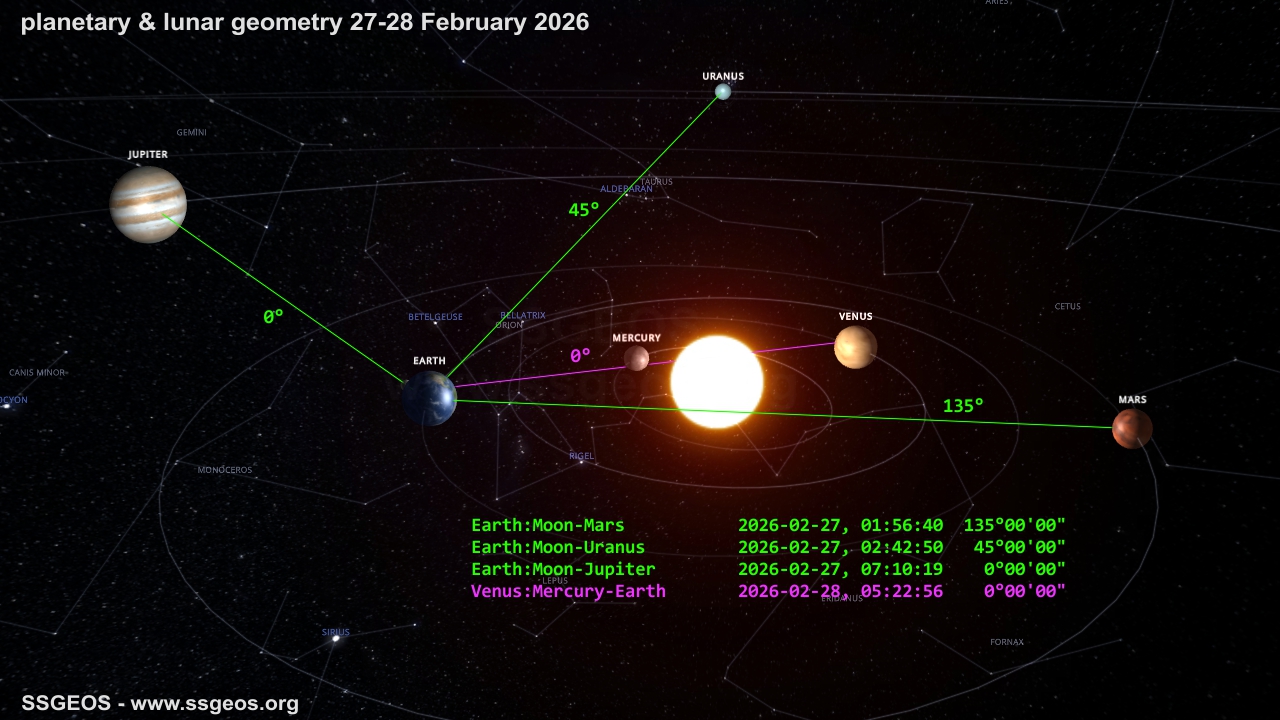The similarity between an electric generator with its carefully placed magnets and the sun with its ever-changing planets is intriguing. In the generator, the magnets are fixed and produce a constant electrical current. If we consider that the planets are magnets and the sun is the armature, we have a considerable similarity to the generator.
- John H. Nelson, RCA
>> Refresh the page in your browser to make sure you have the latest forecast update. <<
EARTHQUAKE FORECAST
updated 26 February 2026, 15:22 UTC
EARTHQUAKE WARNING
A convergence of planetary and lunar geometry on 27-28 February can trigger stronger (M≥5.5) earthquakes later on the 27th and 28th, with a slight possibility of a large earthquake around the 28th.
The positions of Mars, Jupiter and Uranus combined will probably cause stronger seismic activity above average until at least 4 March.
MAGNITUDE PROBABILITY
updated 27 February 2026, 18:58 UTC
| 5.5 - 6.4 | 6.5 - 6.9 | 7.0 - 7.4 | 7.5 - 8.4 | ≥ 8.5 |
| 70% | 60% | 50% | 50% | 30% |
Support SSGEOS!

The similarity between an electric generator with its carefully placed magnets and the sun with its ever-changing planets is intriguing. In the generator, the magnets are fixed and produce a constant electrical current. If we consider that the planets are magnets and the sun is the armature, we have a considerable similarity to the generator.
- John H. Nelson, RCA
The Electromagnetic Geometric Framework
While the law of gravity works remarkably well within our solar system, it fails on the galactic scale, which prompted scientists to add extra mass — known as dark matter — to allow for the theory to explain the higher orbital velocities of stars. Based on our observational research from the last 14 years we propose that the electromagnetic (EM) force dominates on large scales through harmonic resonance and magnetic coupling, whereby the relationship between Gravity and Mass GM is geometrically defined.
Introduction with links explaining the framework.
What is SSGI
The Solar System Geometry Index (SSGI) is an indicator for anticipating large(r) seismic activity. See a brief explanation here. Examples of the SSGI and larger earthquakes are in the earthquake reports section.
Earthquake and Lightning Parallels
While Earth's atmosphere is a different medium with different mechanisms than Earth's crust, there are interesting parallels to consider between earthquakes and lightning, as both manifest as a sudden discharge resulting from energy built-up. Here we explore the parallels and analogies between these two natural phenomena.
Clue to Earthquake Lightning Mystery
Mysterious lightning flashes that appear to precede earthquakes could be sparked by movements in the ground below, US scientists say.
Scientists took a tupperware container filled with flour, tipped it back and forth until cracks appeared and it produced 200 volts of charge. There isn't a mechanism that explains this. It seems new physics. If the same occurs along faultlines, it could generate millions of volts.
Full article
Earthquake Alarm
Impending earthquakes have been sending us warning signals — and people are starting to listen
Researchers in Taiwan monitored 144 earthquakes between 1997 and 1999, and they found that for those registering 6.0 and higher the electron content of the ionosphere changed significantly one to six days before the earthquakes.
[..] The connection between large earthquakes and electromagnetic phenomena in the ground and in the ionosphere is becoming increasingly solid. Researchers in many countries, including China, France, Greece, Italy, Japan, Taiwan, and the United States, are now contributing to the data by monitoring known earthquake zones. Full article.
Planetary Conjunctions at the Time of Major Earthquakes
data and statistics that demonstrate an obvious relationship between the occurrence of planetary conjunctions (alignments) and major (M ≥ 7) earthquakes Full article
Venus in Conjunction with Outer Planets
The majority of earthquakes with magnitude ≥ 7.5 occurs near the time of a convergence of 2-4 planetary conjunctions, one or more of which include Venus with an outer planet. Full article
Geometry and Dynamics of the Solar System
The question is, why do we have two terms representing a single geometric constant? In this question lies the true mystery of the gravitational constant G. We know that it is geometric in origin because the mean velocity and period of an orbiting body in Space depend solely on its mean distance from the central body.
The key is electromagnetic radiation transmitted by a central body, such as a star or a planet. This radiation creates a field that naturally forces a revolving body to assume an orbit at a specific, geometrically determined distance, which alone determines the orbital velocity and period.
Full Article
A 333-Years Comet: Are Negra, Kirch and ISON the same object?
The intriguing fact remains: feed one modest, bound elliptical orbit into an n-body simulator and — without any further tweaking — we recover three of the most famous #sungrazers in history, including the exact medieval description of Earth flying through a comet’s tail... . Full article
Solar Cycles and the Planetary Dynamo
The planets' influences combine to produce a "fundamental" ~11-years attractor, with deviations arising from multi-planet interactions... [Full article]
Solar Activity versus Planetary/Lunar Influence on Seismic Activity
In the quest to unravel the subtle forces that nudge Earth's restless crust toward rupture, scientists have long scrutinized celestial influences beyond the relentless grind of tectonic plates. Among these, two prominent contenders emerge: the erratic bursts of solar activity—sunspots, flares, and geomagnetic storms — and the rhythmic geometric alignments of planets and the Moon. [Full article]

?>)
